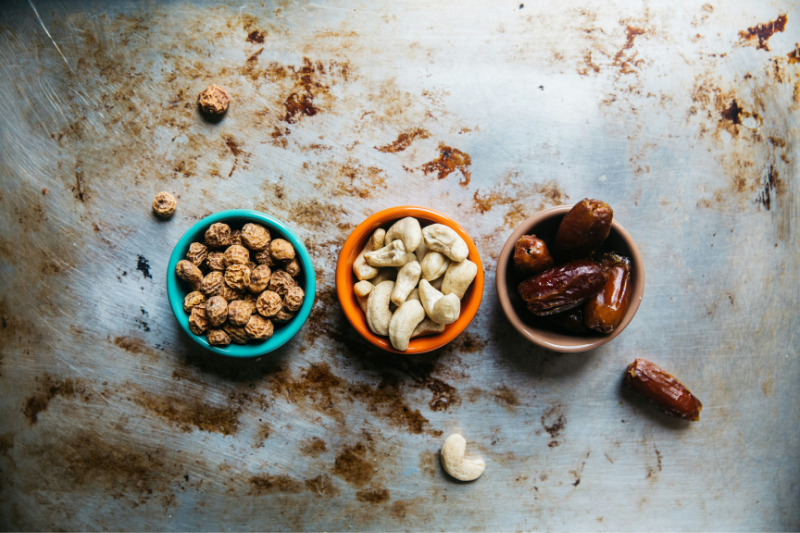A clinical nutritionist's top tips for staying healthy this Ramadan
Here’s how you can nail Ramadan nutrition…
The Holy month of Ramadan is the perfect time for not only a psychological reset, but also a physical one. Fasting has several benefits for the human body, many unknown to us, and this time can be used to build beneficial habits that we can carry with us even after the month is over. Nutrition in Ramadan can be a tricky one, which is why we asked Nur Al Abrach, Clinical nutritionist and Head of clinical education at Nabta Health, to dish out her top tips and answer some of our questions about how we can make the most of this month.

Can you explain to us the science behind the benefits of fasting? How does it positively affect our body?
Fasting can trigger various physiological changes in the body. One key mechanism is autophagy, where the body cleans out damaged cells and regenerates new ones. Fasting also helps regulate insulin levels, which can lead to improved insulin sensitivity and reduced inflammation. Additionally, it may promote weight loss by increasing metabolic rate and promoting fat burning. However, it’s important to approach fasting safely and consult with a healthcare professional before starting any fasting regimen.
How can one build a balanced and beneficial suhoor and Iftar meal?
Building balanced and beneficial suhoor (pre-dawn meal) and iftar (meal to break the fast) meals involves including a variety of nutrients to sustain energy levels and promote overall health. Here are some tips:
Suhoor:
- Start with complex carbohydrates like whole grains (oats, whole wheat bread)
for sustained energy throughout the day. - Include protein sources such as eggs, yogurt, or lean meats to help you feel full
longer. - Incorporate healthy fats like nuts, seeds, or avocado to support satiety and
provide essential fatty acids. - Hydrate well with water and consider adding hydrating foods like fruits and
vegetables to help prevent dehydration during the day. - Avoid sugary foods and beverages that can cause energy crashes later on.
Iftar:
- Break your fast with dates and water to replenish energy and hydrate quickly.
- Include a balance of carbohydrates, proteins, and fats in your meal to replenish
energy stores and promote muscle repair. - Opt for lean protein sources like grilled chicken, fish, legumes, or tofu.
- Incorporate plenty of vegetables and salads for fiber, vitamins, and minerals.
- Choose complex carbohydrates like brown rice, quinoa, or whole wheat pasta
for sustained energy. - Limit fried and high-fat foods, opting for healthier cooking methods like baking,
grilling, or steaming. - Remember to hydrate adequately throughout the meal and avoid overeating to
prevent discomfort later on.
With the long working hours, traffic stress and fast-paced life of Dubai, how can we use Ramadan to reset our life?

Ramadan presents a unique opportunity for self-reflection, mindfulness, and resetting priorities. Here are some ways you can leverage Ramadan to reset your life amidst the hustle and bustle of Dubai:
- Practice Mindfulness: Take moments throughout the day to pause, reflect, and
be present in the moment. Whether it’s during prayer, breaking fast with loved ones,
or enjoying suhoor, mindfulness can help reduce stress and increase gratitude. - Healthy Habits: Use the structured eating schedule of Ramadan to adopt
healthier eating habits. Focus on nourishing your body with nutritious foods during
suhoor and iftar, and avoid overindulgence or unhealthy choices. - Manage Stress: Incorporate stress-relief techniques such as deep breathing,
meditation, or light exercise to help manage the pressures of work and traffic. Utilize
the calmness and reflection of Ramadan to find inner peace. - Reconnect with Loved Ones: Spend quality time with family and friends during
Ramadan. Use this time to strengthen relationships, share meals, and engage in
meaningful conversations.
How can women suffering from hormone disorders like PCOD, PCOS and the
likes balance and maintain their hormones during the fasting period?
Women with hormone disorders such as PCOD (Polycystic Ovary Syndrome) or PCOS (Polycystic Ovary Disorder) may face unique challenges during fasting periods. Here are some tips to help them balance and maintain their hormones during fasting:

You might also like
- Stay Hydrated: Proper hydration is crucial for hormone balance and overall
health, especially during fasting periods. Drink plenty of water between iftar and
suhoor to prevent dehydration and support hormone regulation. - Monitor Blood Sugar Levels: Women with hormone disorders like PCOD or
PCOS often have insulin resistance or fluctuations in blood sugar levels. To help
stabilize blood sugar levels during fasting, focus on low-glycemic index foods, and
avoid sugary or processed foods. - Include Protein and Healthy Fats: Protein and healthy fats can help promote
satiety, stabilize blood sugar levels, and support hormone balance. Include sources of
lean protein such as poultry, fish, tofu, or legumes, and incorporate healthy fats from
avocados, nuts, seeds, and olive oil. - Be Mindful of Portion Sizes: Pay attention to portion sizes during iftar and
suhoor to avoid overeating or undereating. Eating balanced meals with appropriate
portion sizes can help prevent spikes and crashes in blood sugar levels and support
hormone regulation. - Consider Medication Timing: If you are taking medications to manage your
hormone disorder, discuss with your healthcare provider how fasting may impact your
medication schedule. They may recommend adjusting the timing or dosage of your
medications to ensure optimal effectiveness and safety during fasting. - Prioritise Sleep and Stress Management: Adequate sleep and stress
management are essential for hormone balance and overall well-being. Prioritise
getting enough restful sleep and practice stress-reduction techniques such as
mindfulness, deep breathing, or gentle exercise.
How can one build a sustainable movement plan during this month?

To build a sustainable movement plan during Ramadan:
- Choose the Right Time
- Opt for Moderate Intensity
- Shorter Sessions
- Listen to Your Body
- Stay Hydrated
- Include Strength Training
- Be Consistent
What are some of the best food choices to break your fast with?
When breaking your fast, it’s important to choose foods that provide nourishment, hydration, and energy to replenish your body after a day of fasting. Here are some healthy and nutritious food choices to consider:

- Dates: Dates are traditionally consumed to break the fast due to their
natural sweetness and quick energy boost. They are rich in natural sugars,
fiber, vitamins, and minerals. - Soup: Warm and nourishing soups, such as lentil soup, vegetable soup,
or chicken soup, can provide hydration, vitamins, minerals, and essential
nutrients to ease digestion and replenish fluids. - Fruits: Fresh fruits like watermelon, oranges, grapes, and berries are
hydrating and provide natural sugars, vitamins, minerals, and antioxidants. - Grilled chicken, fish, eggs, tofu, or legumes
- Brown rice, quinoa, whole wheat bread, or whole grain pasta
- Vegetables: Include a variety of colorful vegetables in your meal, either
as salads, cooked vegetables, or vegetable-based dishes. Vegetables are rich
in vitamins, minerals, fiber, and antioxidants, supporting overall health and
digestion. - Healthy Fats: Incorporate sources of healthy fats such as avocado, nuts,
seeds, and olive oil into your meal. These fats can help promote satiety, support
nutrient absorption, and provide essential fatty acids. - Dairy Products: Low-fat dairy products like yogurt or labneh can provide
protein, calcium, and probiotics to support digestive health and replenish
nutrients after fasting. - Herbal Tea: Consider ending your meal with a cup of herbal tea, such as
chamomile, mint, or ginger tea, to aid digestion, promote relaxation, and hydrate
your body further.
Images: Unsplash/Socials
